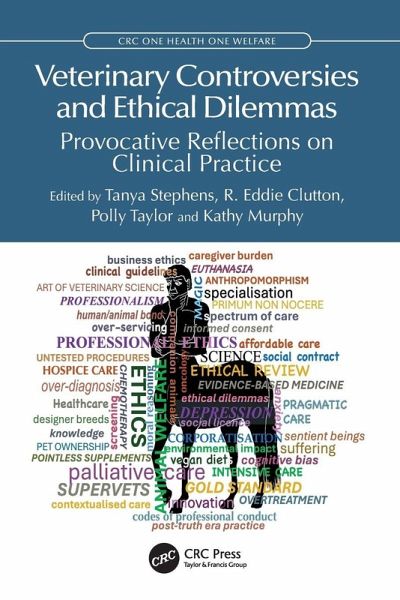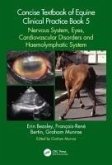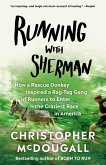Veterinary Controversies and Ethical Dilemmas
Provocative Reflections on Clinical Practice
Herausgeber: Clutton, Eddie; Stephens, Tanya; Taylor, Polly; Murphy, Kathy
Veterinary Controversies and Ethical Dilemmas
Provocative Reflections on Clinical Practice
Herausgeber: Clutton, Eddie; Stephens, Tanya; Taylor, Polly; Murphy, Kathy
- Broschiertes Buch
- Merkliste
- Auf die Merkliste
- Bewerten Bewerten
- Teilen
- Produkt teilen
- Produkterinnerung
- Produkterinnerung
This book identifies increasing concerns with the veterinary profession and confronts them provocatively, aiming to stimulate positive change. With experienced contributors from around the world, each chapter combines personal story with evidence-based reflections. Ideal for use within the veterinary curriculum to stimulate discussion.
Andere Kunden interessierten sich auch für
![Ophthalmic Disease in Veterinary Medicine Ophthalmic Disease in Veterinary Medicine]() Ophthalmic Disease in Veterinary Medicine126,99 €
Ophthalmic Disease in Veterinary Medicine126,99 €![Concise Textbook of Equine Clinical Practice Book 5 Concise Textbook of Equine Clinical Practice Book 5]() Erin BeasleyConcise Textbook of Equine Clinical Practice Book 575,99 €
Erin BeasleyConcise Textbook of Equine Clinical Practice Book 575,99 €![King Solomon's Ring King Solomon's Ring]() Konrad LorenzKing Solomon's Ring13,99 €
Konrad LorenzKing Solomon's Ring13,99 €![The Senses of Animals The Senses of Animals]() Maxwell KnightThe Senses of Animals25,99 €
Maxwell KnightThe Senses of Animals25,99 €![Practical Veterinary Dermatopathology Practical Veterinary Dermatopathology]() Sonya BettenayPractical Veterinary Dermatopathology108,99 €
Sonya BettenayPractical Veterinary Dermatopathology108,99 €![The minds and manners of wild animals; a book of personal observations The minds and manners of wild animals; a book of personal observations]() William T. HornadayThe minds and manners of wild animals; a book of personal observations28,99 €
William T. HornadayThe minds and manners of wild animals; a book of personal observations28,99 €![Running with Sherman Running with Sherman]() Christopher McdougallRunning with Sherman17,99 €
Christopher McdougallRunning with Sherman17,99 €-
-
-
This book identifies increasing concerns with the veterinary profession and confronts them provocatively, aiming to stimulate positive change. With experienced contributors from around the world, each chapter combines personal story with evidence-based reflections. Ideal for use within the veterinary curriculum to stimulate discussion.
Hinweis: Dieser Artikel kann nur an eine deutsche Lieferadresse ausgeliefert werden.
Hinweis: Dieser Artikel kann nur an eine deutsche Lieferadresse ausgeliefert werden.
Produktdetails
- Produktdetails
- Verlag: Taylor & Francis Ltd
- Seitenzahl: 432
- Erscheinungstermin: 14. August 2025
- Englisch
- Abmessung: 229mm x 152mm
- ISBN-13: 9781032579863
- ISBN-10: 1032579862
- Artikelnr.: 72737527
- Herstellerkennzeichnung
- Libri GmbH
- Europaallee 1
- 36244 Bad Hersfeld
- gpsr@libri.de
- Verlag: Taylor & Francis Ltd
- Seitenzahl: 432
- Erscheinungstermin: 14. August 2025
- Englisch
- Abmessung: 229mm x 152mm
- ISBN-13: 9781032579863
- ISBN-10: 1032579862
- Artikelnr.: 72737527
- Herstellerkennzeichnung
- Libri GmbH
- Europaallee 1
- 36244 Bad Hersfeld
- gpsr@libri.de
Tanya Stephens was born and raised in Somerset and then Derby before her family set sail for Australia when she was a teenager. She is a graduate of the University of Sydney in Veterinary Science and has a Masters in International Animal Welfare, Ethics and Law from the University of Edinburgh, is a Member of the Australian and New Zealand College of Veterinary Scientists in Animal Welfare and was made a Fellow of the Royal College of Veterinary Surgeons in 2020 for meritorious contribution to the profession. Tanya established her own small animal practice in Haberfield Sydney and very much enjoys practice. She is also a wildlife researcher with original research on galactosaemia in kangaroos. Her interests lie in professional ethics, animal welfare, research, evidence based medicine, wildlife, the environment and sustainable agriculture. She is a regular presenter and published author on these topics and is the editor of One Welfare in Practice: the Role of the Veterinarian. Tanya holds leadership positions in the Australian Veterinary Association and is the current President of the Conservation Biology Special Interest Group and Chair of the AVA's Animal Welfare Trust, member of a number of Animal Ethics Committees, honorary consulting veterinarian for the Children's Medical Research Institute, veterinary member of the NSW Civil and Administrative Tribunal, Chair of the NSW Kangaroo Management Advisory Panel and Chair of the NSW Greyhound Welfare Integrity Commission Animal Welfare Committee. She is a recipient of the Belle Bruce Reid Medal awarded by the University of Melbourne to Australia's 100 most notable women veterinary science graduates. Tanya is married to Harry, an architect, who designed this book cover, and they have four children and nine grandchildren. Eddie Clutton graduated (BVSC [hons]) from the University of Liverpool in 1981before beginning post-graduate training in the Department of Anaesthesia, The Royal Liverpool Hospital. He worked in the University of Virginia - Maryland, USA for 5 years as assistant professor in Veterinary Anesthesiology. He gained the RCVS Diploma in Veterinary Anaesthesia in 1985. He became Head of Veterinary Anaesthesia in the Royal (Dick) School of Veterinary Studies (Edinburgh) 1990 - 2015. He became a Diplomate of the European College of Veterinary Anaesthesia in 1996. He was editor-in-chief of Veterinary Anaesthesia and Analgesia (2000 - 2005). He was President of the Association of Veterinary Anaesthetists (2005 - 2008). He is a member of the Royal College of Anaesthetists, the Association of Veterinary Anaesthetists, the Animal Welfare Science, Ethics and Law Association, the Laboratory Animal Veterinary Association and the Laboratory Animal Science Association. His research interests include: pain management and depth of anaesthesia monitoring in pigs and sheep; and medical ethics. He was awarded a Chair of Veterinary Anaesthesiology (University of Edinburgh) August 2007. He was a co-founder of EthicsFirst (2016). He was awarded the Morpheus Award in 2019 for exceptional contributions to Veterinary anaesthesia, analgesia and intensive care, and to the European College of Veterinary Anaesthesia and Analgesia. He is currently the Clinical Director of the Wellcome Trust Critical Care Laboratory for Large Animals (Roslin Institute). He was awarded the Fellowship (RCVS) June 2019 for his meritorious contribution to knowledge. In 2024 he was awarded the British Veterinary Association's Dalrymple- Champneys Cup and Medal for the distinctive contributions he has made to the field of veterinary anaesthesia. Polly Taylor graduated as VetMB from Cambridge University in 1976 and worked in general practice before moving to the Cambridge University Veterinary School where she obtained the RCVS DVA. She became chief of anaesthesia at the Animal Health Trust in 1983 and gained her PhD (Cambridge University) in 1987 for her thesis in equine anaesthesia. In 1994 she became University Lecturer and subsequently Reader at the Cambridge University Veterinary School where she was responsible for the clinical anaesthetic service, teaching undergraduates and post graduates and for research in anaesthesia. She became a Diplomate of the European College of Veterinary Anaesthesia in 1995 and was founding President of the College. She has been honoured with a number of awards for her work in anaesthesia and analgesia. In 2024 she was awarded an Honorary Doctorate from the University of Zurich for "contributions to veterinary anaesthesiology and analgesia research, education and animal welfare worldwide". Since 2002 she has worked as an independent consultant in anaesthesia, with work ranging from clinical anaesthesia of numerous species and teaching to drug registration, as well as research, particularly in analgesia. She has published numerous papers on anaesthesia and analgesia in many species, particularly horses and cats. Since its inception in 2008 she has been a director of Topcat Metrology Ltd, developing and supplying bespoke nociceptive threshold testing systems for a wide range of animal species. She was a member of the UK Advisory Council for the Misuse of Drugs (2002-2010) and has continued to be an advocate for the veterinary profession in matters concerning drug legislation. Her most recent activity putting her head above the parapet is to join a growing group showing the profession that overtreatment of animals "just because we can" is often not in their best interests. Kathy Murphy graduated from the Royal Veterinary College, London, in 1999. After spending several years in mixed general practice she moved to the University of Oxford where she completed Certificates in Veterinary Anaesthesia and Analgesia, and Laboratory Animal Science, whilst working as a clinical laboratory animal vet. Remaining at the University of Oxford she was awarded a Wellcome Trust Fellowship for her PhD in behavioral neuroscience and went on to the position of Assistant Professor of Neuroscience and Anesthesiology at the Icahn School of Medicine, Friedman Brain Institute, in New York City. Returning to the University of Oxford in 2013 for the clinical academic position of Laboratory Animal Anaesthetist; and then to Newcastle University, UK, in 2016 for the position of Director of the Comparative Biology Centre. During this time she carried out a concurrent alternate track European College residency in Veterinary Anaesthesia and Analgesia, which provided the opportunity to return to companion animal work in a variety of settings, both first opinion and referral practice - private, academic, corporate and independent. She currently works as a consultant in change management, and holds non-exec board positions. She is founder and director of Barking Brains Ltd, a science communication platform; is co-founder of EthicsFirst; past Trustee and veterinary advisor for the Rottweiler Welfare Association and fills time on ethical review panels, working groups and with ad hoc reviewing, lecturing and MSc/PhD supervision.
Part I: Introduction 1. Veterinary controversies and ethical dilemmas: an
introduction 2. Veterinary killing: history and ethics 3. The law, animals,
and veterinarians 4. Sentient beings: our duty of care. Who are our
patients? 5. Let's all march for (veterinary) science: veterinary science
in a post truth society Part II: Some Ethical Challenges Facing The
Veterinary Profession Too much veterinary medicine 6. Just because we can
doesn't mean we should 7. Overdiagnosis 8. Do you want bloods with that? 9.
Oncology and ethics 10. Small animal overtreatment: intensive care
Research on companion animals 11. Innovation versus experiment: experiments
on pets? 12. Veterinary ethical review. a multitude of questions 13. Can
considering laboratory animal legislation improve animal welfare in
innovative veterinary practice? Evidence-free veterinary medicine 14. Why
believe in magic? The use of ineffective therapies has animal welfare and
ethical implications 15. Should complementary and alternative veterinary
medicine be considered malpractice? An ethical-legal analysis 16. Pointless
supplements and 'therapeutic' pet foods Exotic animal medicine 17. Zoo vet
dilemmas. a personal perspective 18. The value of mice Part III: why are
these controversies arising? Through changes at numerous levels of the
veterinary-client-patient relationship The animal population 19. Problems
with pedigrees: righteous rage and the need for nuance 20. Ageing pets and
physical rehabilitation The veterinary profession 21. Veterinary education
and the changing profession 22. The art of veterinary science 23.
Veterinary academia, specialization, and animal welfare 24. What are
general practitioners good for? 25. Do vets need to love animals? 26. It is
time to ditch the gold standard 27. Informed consent. in whose interests?
28. The death of veterinary euthanasia 29. Moral stress, emotional labour
and mental health in the veterinary profession Veterinary practice 30. The
customer isn't always right: why business ethics is not professional ethics
31. Corporatisation: do shareholders care about animal welfare? 32. Costs
of veterinary services as an animal welfare issue Veterinary clients 33.
Anthropomorphism in veterinary practice 34. Going to extremes: high
financial cost, overtreatment and palliative care 35. Give the dog a bone
Vets in society 36. Is the veterinary profession encouraging exploitation
of horses in sport? 37. Vets speaking up for animal welfare38. An approach
to ethical conflicts in practice
introduction 2. Veterinary killing: history and ethics 3. The law, animals,
and veterinarians 4. Sentient beings: our duty of care. Who are our
patients? 5. Let's all march for (veterinary) science: veterinary science
in a post truth society Part II: Some Ethical Challenges Facing The
Veterinary Profession Too much veterinary medicine 6. Just because we can
doesn't mean we should 7. Overdiagnosis 8. Do you want bloods with that? 9.
Oncology and ethics 10. Small animal overtreatment: intensive care
Research on companion animals 11. Innovation versus experiment: experiments
on pets? 12. Veterinary ethical review. a multitude of questions 13. Can
considering laboratory animal legislation improve animal welfare in
innovative veterinary practice? Evidence-free veterinary medicine 14. Why
believe in magic? The use of ineffective therapies has animal welfare and
ethical implications 15. Should complementary and alternative veterinary
medicine be considered malpractice? An ethical-legal analysis 16. Pointless
supplements and 'therapeutic' pet foods Exotic animal medicine 17. Zoo vet
dilemmas. a personal perspective 18. The value of mice Part III: why are
these controversies arising? Through changes at numerous levels of the
veterinary-client-patient relationship The animal population 19. Problems
with pedigrees: righteous rage and the need for nuance 20. Ageing pets and
physical rehabilitation The veterinary profession 21. Veterinary education
and the changing profession 22. The art of veterinary science 23.
Veterinary academia, specialization, and animal welfare 24. What are
general practitioners good for? 25. Do vets need to love animals? 26. It is
time to ditch the gold standard 27. Informed consent. in whose interests?
28. The death of veterinary euthanasia 29. Moral stress, emotional labour
and mental health in the veterinary profession Veterinary practice 30. The
customer isn't always right: why business ethics is not professional ethics
31. Corporatisation: do shareholders care about animal welfare? 32. Costs
of veterinary services as an animal welfare issue Veterinary clients 33.
Anthropomorphism in veterinary practice 34. Going to extremes: high
financial cost, overtreatment and palliative care 35. Give the dog a bone
Vets in society 36. Is the veterinary profession encouraging exploitation
of horses in sport? 37. Vets speaking up for animal welfare38. An approach
to ethical conflicts in practice
Part I: Introduction 1. Veterinary controversies and ethical dilemmas: an
introduction 2. Veterinary killing: history and ethics 3. The law, animals,
and veterinarians 4. Sentient beings: our duty of care. Who are our
patients? 5. Let's all march for (veterinary) science: veterinary science
in a post truth society Part II: Some Ethical Challenges Facing The
Veterinary Profession Too much veterinary medicine 6. Just because we can
doesn't mean we should 7. Overdiagnosis 8. Do you want bloods with that? 9.
Oncology and ethics 10. Small animal overtreatment: intensive care
Research on companion animals 11. Innovation versus experiment: experiments
on pets? 12. Veterinary ethical review. a multitude of questions 13. Can
considering laboratory animal legislation improve animal welfare in
innovative veterinary practice? Evidence-free veterinary medicine 14. Why
believe in magic? The use of ineffective therapies has animal welfare and
ethical implications 15. Should complementary and alternative veterinary
medicine be considered malpractice? An ethical-legal analysis 16. Pointless
supplements and 'therapeutic' pet foods Exotic animal medicine 17. Zoo vet
dilemmas. a personal perspective 18. The value of mice Part III: why are
these controversies arising? Through changes at numerous levels of the
veterinary-client-patient relationship The animal population 19. Problems
with pedigrees: righteous rage and the need for nuance 20. Ageing pets and
physical rehabilitation The veterinary profession 21. Veterinary education
and the changing profession 22. The art of veterinary science 23.
Veterinary academia, specialization, and animal welfare 24. What are
general practitioners good for? 25. Do vets need to love animals? 26. It is
time to ditch the gold standard 27. Informed consent. in whose interests?
28. The death of veterinary euthanasia 29. Moral stress, emotional labour
and mental health in the veterinary profession Veterinary practice 30. The
customer isn't always right: why business ethics is not professional ethics
31. Corporatisation: do shareholders care about animal welfare? 32. Costs
of veterinary services as an animal welfare issue Veterinary clients 33.
Anthropomorphism in veterinary practice 34. Going to extremes: high
financial cost, overtreatment and palliative care 35. Give the dog a bone
Vets in society 36. Is the veterinary profession encouraging exploitation
of horses in sport? 37. Vets speaking up for animal welfare38. An approach
to ethical conflicts in practice
introduction 2. Veterinary killing: history and ethics 3. The law, animals,
and veterinarians 4. Sentient beings: our duty of care. Who are our
patients? 5. Let's all march for (veterinary) science: veterinary science
in a post truth society Part II: Some Ethical Challenges Facing The
Veterinary Profession Too much veterinary medicine 6. Just because we can
doesn't mean we should 7. Overdiagnosis 8. Do you want bloods with that? 9.
Oncology and ethics 10. Small animal overtreatment: intensive care
Research on companion animals 11. Innovation versus experiment: experiments
on pets? 12. Veterinary ethical review. a multitude of questions 13. Can
considering laboratory animal legislation improve animal welfare in
innovative veterinary practice? Evidence-free veterinary medicine 14. Why
believe in magic? The use of ineffective therapies has animal welfare and
ethical implications 15. Should complementary and alternative veterinary
medicine be considered malpractice? An ethical-legal analysis 16. Pointless
supplements and 'therapeutic' pet foods Exotic animal medicine 17. Zoo vet
dilemmas. a personal perspective 18. The value of mice Part III: why are
these controversies arising? Through changes at numerous levels of the
veterinary-client-patient relationship The animal population 19. Problems
with pedigrees: righteous rage and the need for nuance 20. Ageing pets and
physical rehabilitation The veterinary profession 21. Veterinary education
and the changing profession 22. The art of veterinary science 23.
Veterinary academia, specialization, and animal welfare 24. What are
general practitioners good for? 25. Do vets need to love animals? 26. It is
time to ditch the gold standard 27. Informed consent. in whose interests?
28. The death of veterinary euthanasia 29. Moral stress, emotional labour
and mental health in the veterinary profession Veterinary practice 30. The
customer isn't always right: why business ethics is not professional ethics
31. Corporatisation: do shareholders care about animal welfare? 32. Costs
of veterinary services as an animal welfare issue Veterinary clients 33.
Anthropomorphism in veterinary practice 34. Going to extremes: high
financial cost, overtreatment and palliative care 35. Give the dog a bone
Vets in society 36. Is the veterinary profession encouraging exploitation
of horses in sport? 37. Vets speaking up for animal welfare38. An approach
to ethical conflicts in practice








